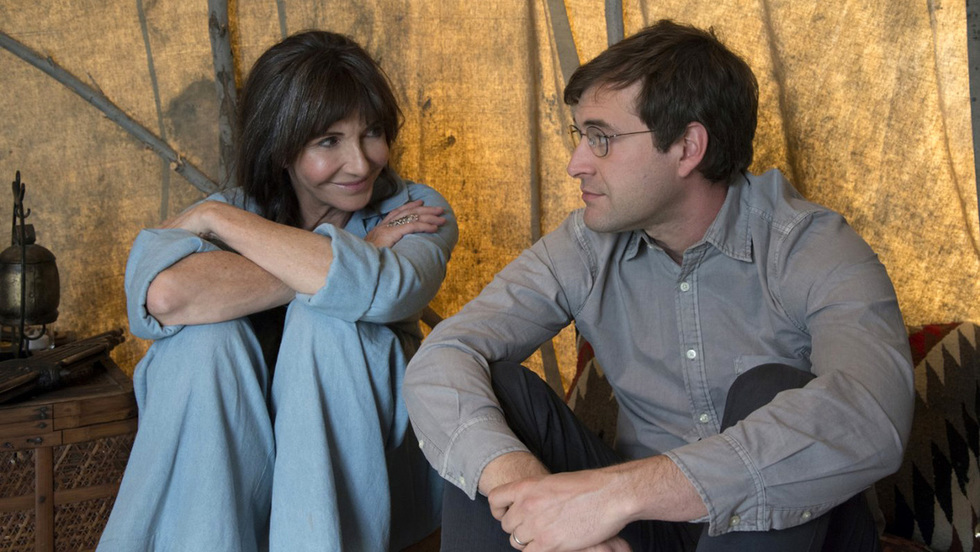
BY MATTHEW ENG |
Mary Steenburgen is TV's Secret Weapon and the Guest Actress of the Year

As the Academy of Television Arts and Sciences prepares to honor the best in television with the imminent unveiling of their 2015 Emmy nominees, let us take time to reflect on the awesomely prolific and totally indispensable contributions of veteran performer and Guest Actress extraordinaire Mary Steenburgen. There's a distinct possibility that Steenburgen might find herself a nominee in either of the Guest Actress categories tomorrow morning, but the trouble is, for which show?
This year alone, Steenburgen has made indelible appearances on the swan season of FX's Justified as the vengeful, ill-fated widow Katherine Hale, an elder and elegantly vicious Lady Macbeth of the Southern Appalachia; as a sweethearted survivor on the first season of Fox's out-there post-apocalyptic sitcom The Last Man on Earth; and as a greying, unearthly hike-trail hippie who revitalizes Mark Duplass' disgruntled Los Angeles neurotic, however briefly, during two terrific episodes of HBO's half-hour dramedy Togetherness. Steenburgen also welcomely pops up on the divisive third season of Netflix's Orange is the New Black (for which she'd be Emmy-eligible next year) as Pornstache's kindly diplomatic mother, who drops into the upturned life of pregnant Daya (Dascha Polanco) with a convenient proposition.
Steenburgen has hopped steadily between film and TV for the bulk of her nearly four-decade career, mostly turning up as mothers for stretches both long and short. She has played Anne Hathaway's in this past year's fly-by indie Song One, Elizabeth Banks' haughty mother on 30 Rock's sixth season, Will Ferrell's biological mom and John C. Reilly's adoptive one in Step Brothers, Elijah Wood's flighty parent across three seasons of Wilfred, and the serene source of materfamilias affection as Ryan Reynolds' mom in The Proposal and on CBS' barely-remembered drama Joan of Arcadia, an unconventionally complex synthesis of familial warmth, religious allegory, and teen angst. Steenburgen never condescends to the roles she's handed, even when they're inferior, or the projects she appears in, even when an actress as good as Steenburgen easily deserves a few more stories that openly care about her characters. But in the past few years, Steenburgen has been called upon to play something other than the calm, dotty, soft-mouthed mother and the results have been intriguing to clock and contemplate. Each of Steenburgen's recent performances is a tiny, unshowy triumph of quietly-sustained characterization, dotted with humor and humanity. They are all welcome additions to the actress' admirable gallery of credible, everyday women, a portfolio that began compiling with 1979's Goin' South and reached a peak point the year after with her offbeat, Oscar-winning performance as the divertingly weird and emotionally-bruised first wife of tabloid curio Melvin Dummar in Jonathan Demme's Melvin and Howard.
Steenburgen's victorious performance is an interesting case study of how to infuse distinctive and seemingly divergent characteristics into the Supporting Actress standby of the wispy, wobbly helpmeet. The prudent, fragile weariness and wiggly, pop-eyed giddiness of Melvin and Howard's homemaker/stripper/game show enthusiast Lynda Dummar work smoothly in tandem, along with that soothingly grainy voice, to contribute a loosely lived-in, low-down portrait of regionally-specific American womanhood that's just as subtly memorable as Steenburgen's ambivalently proto-feminist matriarch in Ragtime, the frazzled stay-at-home mom in Parenthood, the lusty, sad-eyed housewife in What's Eating Gilbert Grape?, the impassive face of cool, corporate precision that Steenburgen indelibly adopts as Philadelphia's key litigator, The Help's briefly-glimpsed but martini-dry book editor, or that babbling, severely ominous neighbor she contributes to one deliciously cryptic scene in David Lynch's Inland Empire, a post-modern masterpiece that benefits, even in a matter of seconds, from Steenburgen's easily engaging groundedness. I've never seen Steenburgen mug or contrive a single beat onscreen, which is probably why each and every one of her characters registers so casually, completely, and innately real; that's not an achievement every actor can attest to.
It's always slightly weird to call an Oscar-winning performer under-appreciated, but truthfully, I don't think we've even begun to value what an especially capable and pleasingly understated performer Mary Steenburgen has remained within an industry full of louder, more attention-grabbing character actors, nor have we granted her the type of bright-enough spotlights with which she could really show us every instrument in her toolkit. Some emerging indie upstart would be well-advised to hand her a starring role in the sort of modestly moving, character-driven dramedy like I'll See You in My Dreams, which the similarly unimpeachable Blythe Danner recently shot to considerable critical and commercial glory. In any case, it's reassuring to know that there's always room for Steenburgen within television's wide and diverse landscape, which isn't as troublingly marred by industry ageism as the movies and has generally provided a welcome environment for older actresses, as well as the broad-minded artists and creators who know that the facility, reliability, and resourcefulness of a performer like Steenburgen rarely diminish with age.
There are countless moments during Steenburgen's brief but breathtaking run on Togetherness where we can clearly catch Duplass' cheerless grump perking up and emerging from his depressive cocoon to stare at Steenburgen's airy, enchanting free spirit with all the wonder, respect, and curiosity that a single look can hold. We understand the feeling.